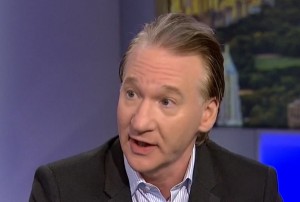Bill Maher ‘Understands’ Dallas Cop-Killer: ‘I’m Surprised Somebody Did Not Fire Back Sooner’
 This is what can happen when you entrust political and social analysis to the same guy you trust to do dick jokes. On Wednesday night’s Hardball, comedian and Real Time host Bill Maher kicked off a full hour with Chris Matthews by discussing the murders of five police officers in Dallas, and the police killings of Alton Sterling and Philando Castile that preceded that attack. In an attempt to dish out his particular brand of “real talk,” Maher told Matthews that while there’s “never any excuse” for shooting a policeman, he “understand(s) the motivation” of the shooter:
This is what can happen when you entrust political and social analysis to the same guy you trust to do dick jokes. On Wednesday night’s Hardball, comedian and Real Time host Bill Maher kicked off a full hour with Chris Matthews by discussing the murders of five police officers in Dallas, and the police killings of Alton Sterling and Philando Castile that preceded that attack. In an attempt to dish out his particular brand of “real talk,” Maher told Matthews that while there’s “never any excuse” for shooting a policeman, he “understand(s) the motivation” of the shooter:
Maher: When it comes to the police, there is never any excuse for what happened. For shooting a policeman? Of course, we all condemn that. There is no ands, ifs, or buts. I don’t condone it, but I do understand it.
Matthews: You understand that guy?
Maher: Well, I understand the motivation, yes. How many videos can you see? How many years can go by when this is going on when black people are brutally assault? The last guy, right on the ground, and he put a slug in him. I’m surprised somebody did not fire back sooner.
The flashing red headline here is, of course, that the Dallas shooter wasn’t firing “back” at anyone, he was just firing. The police officers he attacked were, in fact, engaged in protecting and serving black people at that very moment. Maher may want some slack on the semantics in service of his broader point, but words matter.
Beyond that obvious flaw, though, Bill Maher doesn’t “understand” the black experience any more than Donald Trump does. Maher is filtering white perceptions of black life through how a white person would feel about that already-wrong perception. First of all, black people don’t experience police aggression by accumulating video views, they are immersed in it firsthand, almost from birth. A white person cannot know what that’s like. If a white person decides to accept the version of this reality that they can now see thanks to these videos, then they empathize from the point of view of someone who has always expected to feel safe and protected by the police.
What’s ironic is that in trying to empathize with black people, Maher is actually arousing a visceral anxiety in white people, the idea that black people have been treated so poorly (or “treated” so “poorly” because the “media” says they “have”) that they must be angry at white people, and some day, the dam is going to break, and there’s going to be a race war. They don’t realize that the race war already came and went, and black people are just trying to survive the occupation.
This is an opinion piece. The views expressed in this article are those of just the author.




